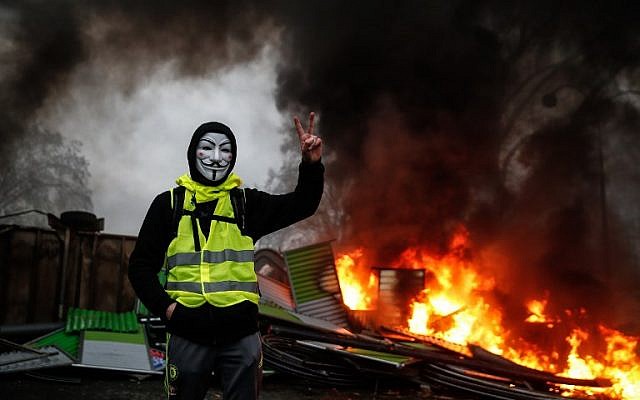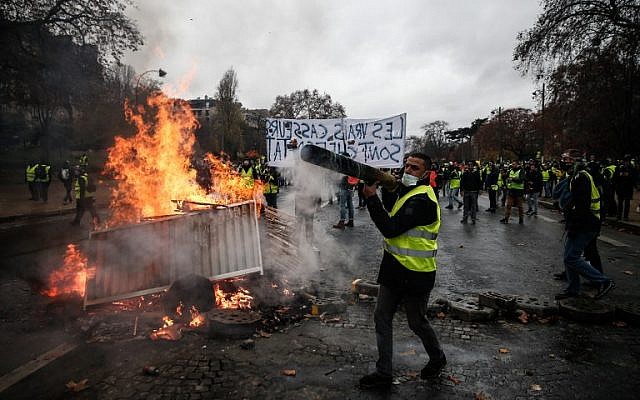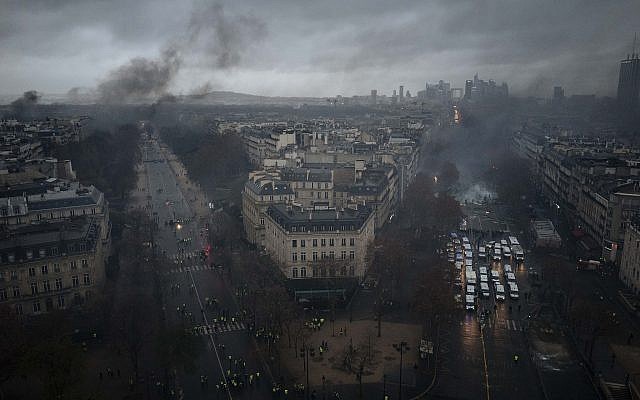Is Paris Burning? is a 1966 film about the Nazi occupation. As the Allies closed in on Paris, the German general in charge was ordered to burn the city before the Allies could seize it. After agonizing over the decision, General Cholitz refuses to level the city and Free French forces march triumphantly down the Champs-Elysees.
How ironic it is that the historic street with the Arc de Triumph in the background was the scene of several vehicle fires set by masked demonstrators who, for the second weekend in a row, are violently protesting the government of President Emmanuel Macron.
The violence started early Saturday morning near the famous Avenue des Champs-Elysees. Dozens of angry protesters, many of them wearing gas masks or ski goggles, threw rocks and projectiles toward French police. In turn, police attempted to disperse the crowd by firing tear gas and blasting water cannons.
Later in the day, violent protesters who were pushed away from the Arc de Triumph used plywood and other material to make barricades on various streets throughout central Paris. Demonstrators also set multiple cars and trash containers on fire over the course of the day.
French Prime Minister Edouard Philippe visited the Paris police command center on Saturday and announced that around 5,500 protesters attended the demonstrations in Paris on Saturday.
Philippe said some protesters attacked police forces “with a rarely seen violence.”
Nearly 200 people were arrested during the protest, Paris police told ABC News. They added that 92 people were injured, including 14 police officers.
What began as protests against a rise in the gas tax has morphed into something far more: a revolt against high taxes, the high cost of living, and the Macron government's policies.
The nationwide protests started in small urban and rural areas of the country, where demonstrators have been blocking roads over the past three weeks. The movement has no clear leader and has attracted groups of people with a wide variety of demands.
Macron, who is currently in Argentina for the G20 summit, said earlier this week in a speech that he understood the complaints expressed by protesters but has so far refused to cancel the planned increased in fuel taxes.
"I feel your pain but go screw yourselves," says Macron. The government response is eerily similar to the response to the migrant issue. The politicians all claim to sympathize with protesters and naysayers, but then go ahead and let more migrants into the country anyway.
This attitude is what ordinary people are rebelling against: uncaring elites instituting policies that the people must bear the burden for. The "yellow jacket" protests are growing in size and unless Macron can get a handle on the problem, there will be violence that Paris hasn't seen since the 1960s.
Protests continued in Paris on Saturday over the Macron’s fuel tax to combat global warming.
Protesters torched cars, attacked police, damaged property and climbed the Arc de Triomphe.
Macron’s France today pic.twitter.com/fjVtlokdc3— Jack Posobiec 🇺🇸 (@JackPosobiec) December 1, 2018
According to the BBC — At least 110 people were injured, including 17 members of the security forces, and 270 arrests were made.
Véhicule de police en feu proche du commissariat du 8eme. pic.twitter.com/u2BFYtzZ2S— Remy Buisine (@RemyBuisine) December 1, 2018
Paris is on fire.
As protesters spread out from the Arc de Triomphe in Paris, daylong clashes between police and "yellow vest" demonstrators left dozens of cars burned out and store-fronts vandalised https://t.co/FdH2Od1CYl— AFP news agency (@AFP) December 2, 2018
Anti-government protesters torched dozens of cars and set fire to storefronts during daylong clashes with riot police across central Paris on Saturday, as thousands took part in fresh “yellow vest” protests against high fuel taxes.
Officers responded with tear gas after being targeted by protesters hurling rocks and other projectiles on the third weekend of demonstrations which have morphed into a broader rebuke of French President Emmanuel Macron.
Police closed off some of the city’s most popular tourist areas as they tried to quell the mayhem in the streets. At least 110 people were injured.
Macron denounced the violence from the G-20 summit in Argentina, saying those who attacked police and vandalized the Arc de Triomphe will be “held responsible for their acts.” He said he will hold an emergency government meeting Sunday on the protests.


It was the third straight weekend of clashes in Paris involving activists dressed in the fluorescent yellow vests of a new protest movement and the worst urban violence since at least 2005. The scene contrasted sharply with other protests in France, where demonstrations and road blockades elsewhere were largely peaceful Saturday.
The violence is Macron’s biggest challenge so far as president, and even colored his international image as he had to defend his plans for fuel tax rises — the initial impetus for the protest movement — to other leaders at the G-20 summit. France’s failure to quell the anger has led to copycat yellow jacket movements in Belgium, Germany and the Netherlands.
One person was in a critical condition after protesters pulled down one of the huge iron gates of the Tuileries garden facing the famed Louvre museum, crushing several people.
“Those responsible for this violence don’t want change or improvement, they want chaos,” Macron said in Buenos Aires.
Macron added that he had convened a meeting with Prime Minister Edouard Philippe, Interior Minister Christophe Castaner and other top officials in Paris on Sunday after his return from Argentina.
“No cause justifies that authorities are attacked, that businesses are plundered, that passers-by or journalists are threatened or that the Arc de Triomphe is defiled,” he said.
Nearly 190 fires were put out and six buildings were set alight, the interior ministry said.
Acrid plumes of smoke and tear gas, however, were testament to the escalation in violence in Paris, to the consternation of many of the “yellow vests”, so-called for the high-visibility jackets they wear.

No comments:
Post a Comment